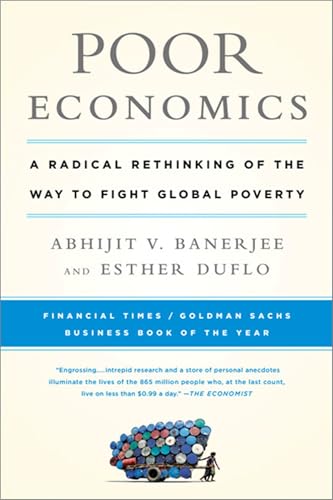Poor Economics
A Radical Rethinking of the Way to Fight Global Poverty
Abhijit V. Banerjee; Esther Duflo
BOOK REVIEW

Poor Economics: A Radical Rethinking of the Way to Fight Global Poverty is not just a groundbreaking book; it's a fierce call to arms for anyone who believes in the possibility of change in the world. In this revelatory work, economists Abhijit V. Banerjee and Esther Duflo tackle the complexities of global poverty with unflinching honesty and an eye-opening perspective, urging you to reconsider long-held assumptions about the lives of the impoverished. 🌍✨️
Delve into the heart of their thesis, where poverty is not merely a backdrop for grand theories of economics but a dynamic tapestry woven from real-life experiences of those who live in it every day. Banerjee and Duflo argue that traditional solutions-ranging from charity to blanket programs-often miss the mark in addressing the intricacies of poverty. Instead of taking a one-size-fits-all approach, they advocate for targeted interventions, the likes of which have proven effective in clearing pathways out of destitution. Their research draws on extensive fieldwork and randomized control trials, giving you fresh insights into what truly works, and more importantly, what doesn't.
The prose in Poor Economics is deeply engaging, punctuated by anecdotes that resonate emotionally. Picture families faced with the cold reality of hunger, betwixt the dichotomy of immediate survival and the hope for a better future. It's these narratives that stir your empathy and inspire a sense of urgency; the authors take complex economic concepts and transform them into relatable stories that linger long after the last page has been turned.
Critics have either praised the book for its innovative approach or dismissed it as overly simplistic, illustrating the contentious nature of its proposals. Some argue that the solutions put forth fall short of addressing systemic inequalities, while others marvel at its potential to reshape developmental policies globally. This juxtaposition reflects the book's overarching theme: reality is nuanced, and so must our solutions be.
The historical context in which Poor Economics emerges is starkly relevant. The global landscape has been rattled by financial crises and the ever-widening gap between the rich and the poor. As climate change disrupts economies and geopolitical tensions escalate, the findings of Banerjee and Duflo become increasingly imperative. Their work is a lifeline thrown into the turbulent waters of economic disparity, igniting discussions among policymakers, activists, and the general public about how to build a more equitable world.
As you navigate through the pages, you're not merely consuming information. You're being invited to awaken your consciousness to a reality often overlooked by those living in comfort. The authors do not shy away from illuminating uncomfortable truths about human behavior and the psychology of poverty. They make you confront the paradoxes that define the lives of billions: how can individuals facing such dire circumstances still maintain hope? This poignant question pulls at your heartstrings and forces you to reflect on your perceptions of poverty.
Poor Economics also acts as a crucible, challenging you to break free from the inertia of ignorance. It compels you to engage in the discourse surrounding economic reforms and social justice. The lessons gleaned from Banerjee and Duflo's research ripple outward from the page, urging you to become an advocate for change in your own community, to support evidence-based policies that lift people out of despair.
Readers have taken to heart the revelations within this influential work, sparking dialogue around its contents far beyond academic circles. Some expressed a newfound motivation to volunteer, donate, or advocate for poverty alleviation initiatives. Others cautioned against the implementation of oversimplified solutions that may arise from ignoring the complexity of individual contexts. The compelling arguments laid out serve as a backdrop for passionate discussions about effective altruism and the role of economic theory in shaping policy.
Banerjee and Duflo demonstrate that understanding poverty is not a theoretical exercise. Instead, it is an urgent moral obligation that demands both compassion and pragmatism. With their engaging style and deep insights, they successfully translate a complex subject into something universally relatable and richly profound.
In a world starved for impactful change, Poor Economics is your road map. It will make you laugh, cry, and most importantly, think critically about how we can combat the insidious grip of poverty. The book leaves an indelible mark on your conscience, compelling you to engage with the pressing question: What will you do, armed with this new knowledge? The answer, dear reader, could be the key to a better, more just world. 🌟
📖 Poor Economics: A Radical Rethinking of the Way to Fight Global Poverty
✍ by Abhijit V. Banerjee; Esther Duflo
🧾 320 pages
2012
#poor #economics #radical #rethinking #fight #global #poverty #abhijit #banerjee #AbhijitVBanerjee #esther #duflo #EstherDuflo